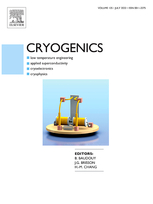
Summary
Resin cracking, a cause of coil quenching in superconducting magnets, occurs when a resin contains small flaws and sustains high thermal stress. Seven epoxy resins were chosen in order to evaluate thermo-mechanical properties, small-flaw strength, and creep deformation at low temperatures. Although the plain specimen strengths consistently increase as the temperature decreases, the fracture toughness resulting from large cracks reaches a maximum at around 80 K and then decreases at 4 K. The loss factor during cyclic loading behaves similarly, because of low-temperature relaxation of the resin, and has a maximum value at around 150 K.
Details
- Original title: Cryogenic small-flaw strength and creep deformation of expoxy resins.
- Record ID : 2001-2608
- Languages: English
- Source: Cryogenics - vol. 39 - n. 9
- Publication date: 1999
Links
See other articles in this issue (3)
See the source
Indexing
-
Evaluation of epoxy resin for cryogenic use by ...
- Author(s) : NISHIJIMA S., HONDA Y., KOBAYASHI Y., OKADA T., NAMBA S.
- Date : 1994
- Languages : Japanese
- Source: Cryogenics/ Cryog. Eng. - vol. 29 - n. 9
View record
-
Double-notch interlaminar shear strength of G-1...
- Author(s) : WANG R., SHINDO Y., HORIGUCHI K., SANADA K.
- Date : 1997
- Languages : Japanese
- Source: Cryogenics/ Cryog. Eng. - vol. 32 - n. 1
View record
-
MECHANICAL PROPERTIES AND STATIC FRICTION BEHAV...
- Author(s) : MICHAEL P. C.
- Date : 1990
- Languages : English
- Source: Cryogenics - vol. 30 - n. 9
View record
-
Compressive properties of continuous alumina fi...
- Author(s) : GU Y. H.
- Date : 1992
- Languages : English
- Source: Cryogenics - vol. 32 - n. 4
View record
-
Cryogenic composite supports: a review of strap...
- Author(s) : REED R. P., GOLDA M.
- Date : 1997/05
- Languages : English
- Source: Cryogenics - vol. 37 - n. 5
View record
